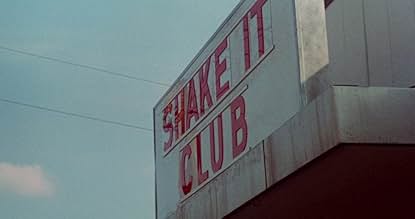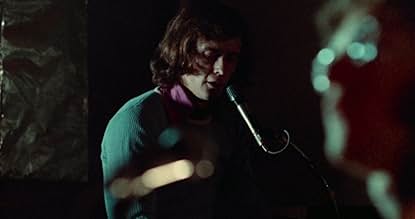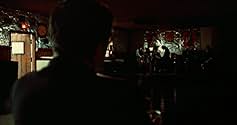Comfortable New York suburbanites Arthur and Gerrie Mason learn that their seemingly innocent teenage daughter Maxie is a drug addict.Comfortable New York suburbanites Arthur and Gerrie Mason learn that their seemingly innocent teenage daughter Maxie is a drug addict.Comfortable New York suburbanites Arthur and Gerrie Mason learn that their seemingly innocent teenage daughter Maxie is a drug addict.
Anthony D. Call
- Dr. Lauren
- (as Anthony Call)
Janet Sarno
- Night Nurse
- (as Jan Sarno)
Featured reviews
"The People Next Door" is an exploitation movie masquerading as an important social document. The cast, photography and production promise "class", while the script, direction and execution scream "cash-in".
Comfortable New York suburbanites Arthur and Gerrie Mason (Eli Wallach and Julie Harris) discover one night that their seemingly perfect 16-year old daughter, Maxie (Deborah Winters) has been tripping on LSD. Arthur, a smug, bullying braggart, immediately suspects his 17-year old (long-haired) son, Artie (Stephen McHattie) of supplying the drug to his sister, and kicks him out of the house. Whereupon, (suitably) confused Harris runs next door to seek advice from high school principal David Hoffman (Hal Holbrook) whose wife, Tina (a pre-"Phyllis" Cloris Leachman) is an alcoholic, and whose son Sandy (Don Scardino) has his own problems. Very sensibly, he advises love and understanding on the part of the parents, which all but goes out the window when Maxie confesses she has been tripping for quite a while now, is also sexually active and on THE PILL. Naturally,she just keeps getting worse--she's found by her father high on cocaine and in bed with a biker. From there, it's straight to family therapy where, among other things, it's revealed that Dad is having an affair with his lusty secretary (a pre-"Golden Girl" Rue McClanahan) and Mom knew it all the time. After another lamentably useless (and unintentionally hilarious) therapy session, the Masons decide to throw a party(?) which comes to an abrupt halt when one of the hired musicians is discovered puffing pot. Maxie then gets hold of more LSD, does a nude dance on her lawn and trips herself into a seedy mental hospital. The sight of her near-catatonic daughter in this horrible place drives Mom right to bed, where she remains until the film's climax.
More a catalog of just about every ailment bedeviling middle class families in the seventies than a worthwhile attempt at explaining them, "The People Next Door" lurches from one crisis to the next with very little happening in between. That's a shame, because the cast is excellent, but trapped in parts which are less like flesh and blood characters in a drama, than stereotypes in a ''Saturday Night Live'' sketch. For example, Wallach hypocritically swallows massive amounts of sleeping pills, Harris chain-smokes her way through the story, and all involved are on edge from beginning to end. Along the way, McHattie heads a rock band (dubbed by short-lived group, The Bead Game) principal Holbrook must deal with a student riot, and Wallach gooses Leachman when the opportunity arises. Yes, The movie gives you your money's worth in 93 minutes, that's for sure, but those who are wondering what the point is, will never find out. At least most B movies don't attempt to hide behind ''artistic'' pretensions.
Comfortable New York suburbanites Arthur and Gerrie Mason (Eli Wallach and Julie Harris) discover one night that their seemingly perfect 16-year old daughter, Maxie (Deborah Winters) has been tripping on LSD. Arthur, a smug, bullying braggart, immediately suspects his 17-year old (long-haired) son, Artie (Stephen McHattie) of supplying the drug to his sister, and kicks him out of the house. Whereupon, (suitably) confused Harris runs next door to seek advice from high school principal David Hoffman (Hal Holbrook) whose wife, Tina (a pre-"Phyllis" Cloris Leachman) is an alcoholic, and whose son Sandy (Don Scardino) has his own problems. Very sensibly, he advises love and understanding on the part of the parents, which all but goes out the window when Maxie confesses she has been tripping for quite a while now, is also sexually active and on THE PILL. Naturally,she just keeps getting worse--she's found by her father high on cocaine and in bed with a biker. From there, it's straight to family therapy where, among other things, it's revealed that Dad is having an affair with his lusty secretary (a pre-"Golden Girl" Rue McClanahan) and Mom knew it all the time. After another lamentably useless (and unintentionally hilarious) therapy session, the Masons decide to throw a party(?) which comes to an abrupt halt when one of the hired musicians is discovered puffing pot. Maxie then gets hold of more LSD, does a nude dance on her lawn and trips herself into a seedy mental hospital. The sight of her near-catatonic daughter in this horrible place drives Mom right to bed, where she remains until the film's climax.
More a catalog of just about every ailment bedeviling middle class families in the seventies than a worthwhile attempt at explaining them, "The People Next Door" lurches from one crisis to the next with very little happening in between. That's a shame, because the cast is excellent, but trapped in parts which are less like flesh and blood characters in a drama, than stereotypes in a ''Saturday Night Live'' sketch. For example, Wallach hypocritically swallows massive amounts of sleeping pills, Harris chain-smokes her way through the story, and all involved are on edge from beginning to end. Along the way, McHattie heads a rock band (dubbed by short-lived group, The Bead Game) principal Holbrook must deal with a student riot, and Wallach gooses Leachman when the opportunity arises. Yes, The movie gives you your money's worth in 93 minutes, that's for sure, but those who are wondering what the point is, will never find out. At least most B movies don't attempt to hide behind ''artistic'' pretensions.
Seemed like one of those after school special on troubled teens, preoccupied parents, and anti-drugs turned all the way up to 11. Wasn't in the mood for it.
(1970) The People Next Door
PSYCHOLOGICAL DRAMA
It has parents, Arthur Mason (Eli Wallach) and Gerrie Mason (Julie Harris) have two children with promising music careers- one as a pianist; their daughter, Maxie Mason (Deborah Winters) and their rock and roll son, Artie Mason (Stephen McHattie). Problems start as soon as their daughter, Maxie begins to try acid and she not only gets herself hooked but also craves to try other drugs such as LSD.
Upon looking at the rating of one of my favorite movie critics, Roger Ebert, I was quite surprised he gave this movie a positive rating to the tune of 3 and a half stars out of 4 when I thought when I watched it, it felt it was out of touch and outdated. Upon glancing Ebert's review, he kept mentioning the documentary "Woodstock", as if the two movies are somehow linked- they are not. Perhaps during the era but these days there are better movies made about the subject matter than their were back then. It is also more unlikely that a daughter pianist would get into drugs than someone who is into rock and roll who happens to be the family's son. It also does not address other drugs that can be helpful such as marijuana and mushrooms to which tests have been revealed they can be helpful, but are often abused.
It has parents, Arthur Mason (Eli Wallach) and Gerrie Mason (Julie Harris) have two children with promising music careers- one as a pianist; their daughter, Maxie Mason (Deborah Winters) and their rock and roll son, Artie Mason (Stephen McHattie). Problems start as soon as their daughter, Maxie begins to try acid and she not only gets herself hooked but also craves to try other drugs such as LSD.
Upon looking at the rating of one of my favorite movie critics, Roger Ebert, I was quite surprised he gave this movie a positive rating to the tune of 3 and a half stars out of 4 when I thought when I watched it, it felt it was out of touch and outdated. Upon glancing Ebert's review, he kept mentioning the documentary "Woodstock", as if the two movies are somehow linked- they are not. Perhaps during the era but these days there are better movies made about the subject matter than their were back then. It is also more unlikely that a daughter pianist would get into drugs than someone who is into rock and roll who happens to be the family's son. It also does not address other drugs that can be helpful such as marijuana and mushrooms to which tests have been revealed they can be helpful, but are often abused.
The People Next Door captures the spirit of it's age in a way few other films of it's era have. Eli Walach and Julie Harris are two of the greatest actors of our time and play remarkably well together. Just check out the last few scenes of this movie. Their performances help keep this film from becoming dated. The subject matter is touchy stuff. It deals with teenage alienation, rebellion and trust. Many films of this era are somewhat tongue in cheek, this movie however never lets up. It takes itself very seriously and as a result has often been misunderstood. The music is cool and so is the rest of the cast. This is a must see for anyone interested in forgotten classics of the early seventies.
This is one of those hysterical 70's anti-drug movies made by people who obviously had little or no experience with real-life drug abuse. If you have never seen on of these, I urge you to do so (preferably stoned).The drama begins when the seemingly innocent sixteen-year-old daughter (Deborah Winters) of a middle-class family is found whimpering in her closet and tripping her face off. The cantankerous father (Eli Wallach) quickly blames his long-haired musician older son (Stephen McHattie) and kicks him out of the house, while the mother (Julie Harris) recedes into a kind of a hysterical, walking coma. But like all virginal, middle-class girls in these movies, once she gets her first taste of drugs, the daughter is soon shacking up with a skeezy biker and putting every substance imaginable into her nubile, young body. Meanwhile, the father confides in his doctor friend next door(Hal Holbrook), who seems to have the perfect All-American family in wife ( ) and clean-cut son (Don Scardino), but there's a twist there which you'll doubt see coming from a mile away.
I expected this to strictly be a TV movie, but actually it started out as that in 1968 before being remade as this theatrical feature, complete with some mild sordidness, fairly graphic drug use, brief nudity, and actual cursing. Eli Wallach is great as the cantankerous, bigoted father who is almost certain to get some kind of comeuppance. Harris and McHattie are adequate, but don't have a lot to do as most of the scenery around them gets pre-shredded by their fellow thespians. The latter's band actually isn't bad, and that is probably the "hippest" aspect of this generally "square" movie. Hal Holbrook has an interesting role as he starts out playing his usual type (the kindly father figure),but ends up going very much against type. Obscure 70's TV actress Deborah Winters (who isn't remotely believable as sixteen year old) gives a wide-eyed, completely over-the-top performance that will probably provoke more laughter than anything else, but she is very cute and does have a nude scene (only brief, but she's all drugged-up and throwing herself at her own father at the time, so. . .).
The director of this, David Green, was British and made several interesting theatrical films in his home country like "I Start Counting", "The Strange Affair", and "The Shuttered Room". This was the beginning of his long descent into 70's American television (a similar fate befell other talented Brit directors like John Moxley, Gordon Hessler, and Robert Fuest). This isn't a spot on his earlier theatrical work, but it's much better than his later made-for-TV stuff like "Vacation in Hell". See this with your favorite controlled substance.
I expected this to strictly be a TV movie, but actually it started out as that in 1968 before being remade as this theatrical feature, complete with some mild sordidness, fairly graphic drug use, brief nudity, and actual cursing. Eli Wallach is great as the cantankerous, bigoted father who is almost certain to get some kind of comeuppance. Harris and McHattie are adequate, but don't have a lot to do as most of the scenery around them gets pre-shredded by their fellow thespians. The latter's band actually isn't bad, and that is probably the "hippest" aspect of this generally "square" movie. Hal Holbrook has an interesting role as he starts out playing his usual type (the kindly father figure),but ends up going very much against type. Obscure 70's TV actress Deborah Winters (who isn't remotely believable as sixteen year old) gives a wide-eyed, completely over-the-top performance that will probably provoke more laughter than anything else, but she is very cute and does have a nude scene (only brief, but she's all drugged-up and throwing herself at her own father at the time, so. . .).
The director of this, David Green, was British and made several interesting theatrical films in his home country like "I Start Counting", "The Strange Affair", and "The Shuttered Room". This was the beginning of his long descent into 70's American television (a similar fate befell other talented Brit directors like John Moxley, Gordon Hessler, and Robert Fuest). This isn't a spot on his earlier theatrical work, but it's much better than his later made-for-TV stuff like "Vacation in Hell". See this with your favorite controlled substance.
Did you know
- TriviaDavid Greene thought that the final cut of the film was so distorted that he tried, without success, to have his name removed from the credits.
- Quotes
Old couple's son: [to father] You are a shit! Why don't you just go away someplace and die? Just die!
- ConnectionsFeatured in Classroom Scare Films Vol. 5: More Drug Evils (1997)
- SoundtracksMama, Don't You Wait Up for Me
Written by Scott English (as Scott David English) and Larry Weiss
Sung by The Glass Bottle
- How long is The People Next Door?Powered by Alexa
Details
Box office
- Gross US & Canada
- $217,510
Contribute to this page
Suggest an edit or add missing content






























